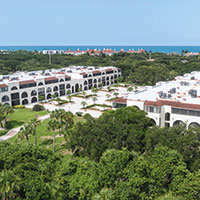 Local condo owners: Relief law is ‘better than nothing’
Local condo owners: Relief law is ‘better than nothing’
STORY BY PIETER VANBENNEKOM (Week of July 3, 2025)
Gov. Ron DeSantis last week finally signed the amendments to the condominium inspections law worked out during this year’s state legislative sessions, but a leading local condo owner says the new legislation is merely a “step in the right direction” and doesn’t provide all the financial relief needed to keep beleaguered condo owners in their homes.
“I suppose it’s better than nothing,” said Mark Shea, board president of the homeowners association (HOA) at Robles del Mar, a 72-unit condo complex on Highway A1A in Indian River Shores. Shea is also one of the founding members of the Treasure Coast Condominium Alliance (TCCA), a group of close to 20 condominium HOAs from Stuart to Indian River County that had hired a Tallahassee lobbyist to work on reforming the condo law.
“The new revisions offer some temporary help but at least we have a seat at the table now,” Shea said. “It doesn’t give us everything we asked for and needed, but we’re going back next year and hopefully get the rest.”
Condo owners across the state, but especially those in 32963, had already been hit by an avalanche of special assessments and maintenance fee increases because of the nationwide insurance crisis that in many cases tripled insurance rates when the new condo reform law imposed even more onerous requirements on condominium associations in the wake of the Surfside condominium collapse.
“These reforms will make condo safety measures more affordable,” DeSantis said, “and ensure that residents aren’t being regulated out of their homes.”
After 98 people were killed in the midnight collapse of the Champlain Towers building in South Florida in 2021, the legislature passed a bill forcing all condo associations to fully fund reserves for needed repairs and complete milestone inspections for structural problems by the end of last year.
At the Champlain Towers building, successive HOA boards had kept postponing needed repairs when individual condo owners would not vote for the needed assessments to make the repairs.
Local condo associations say the law was well-intended, but had unforeseen consequences with huge cost increases both for the actual inspections and then for the repairs mandated by the inspection reports and the requirement to immediately bring reserves up to 100 percent.
As a result, there is a glut in the condo market statewide and property values for older condo buildings have been negatively impacted in a buyers’ market.
“People need to be able to afford to live in these units and especially if they’re getting assessments on things that maybe do need to get done,” DeSantis said at a ceremony at a Clearwater restaurant where he signed two condo reform bills. The other bill makes minor changes to the MySafeFlorida pilot program providing some help for condo associations that want to strengthen their properties against storms and mitigate possible hurricane damage.
“They (the condo associations) need to be able to work out those things that need to get done,” DeSantis said. “You shouldn’t have this mandate apply this way.”
Specifically, the new condo amendments now signed into law by DeSantis give HOAs some flexibility in how to fund needed reserve increases – new permissible financial instruments added were loans and lines of credits from banks or other financial institutions.
The deadline for completing Structural Integrity Reserve Studies (SIRS) was extended by a year to the end of this year (although most buildings had already completed the studies anyway last year as per the original law), and HOAs were also given the power to pause reserve contributions for up to two years to prioritize repairs and start with the most urgent ones.
To minimize possible conflicts of interest on the part of building inspectors who seemed to have unlimited power to impose repair costs at will, the new laws force inspectors to disclose in advance if they, or anyone associated with them, intend to bid on the work. Any undisclosed financial relationship between inspectors and repair firms may result in disciplinary action by the relevant licensing authority.
Condo owners selling their units are now also obligated to disclose to any potential buyers the most recent financial statements and budgets of the HOAs to which they belong.
Budgets including hefty costs for repairs and inspections mandated by the law have scared off many potential condo buyers, creating the present glut in the condo market.
Shea said that in the condo alliance’s future lobbying efforts, condo owners will press for even more financial flexibility in funding repairs and further strengthen the conflict-of-interest protections against inspectors and repair firms, allowing condo associations to seek second opinions on mandates considered arbitrary and unnecessarily costly.



